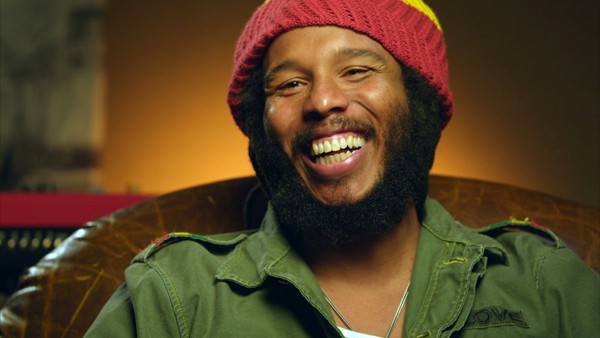When Ziggy Marley walks into the room, his father’s presence takes over. Waist-length dreadlocks are wrapped up in a hand-crocheted beanie. He wears the same kind of fitted jean shirt his father made sexy in the ’70s, and the laces of his scuffed leather boots are untied.
Settling in, he opens a copy of last week’s Bohemian, noticing his son Daniel “Bambaataa” Marley’s show that evening in Petaluma. “Aaah, I wish him a good gig, that Bam Bam,” he says.
Ziggy has the same soft demeanor you’ll see in interviews with Bob Marley, amusement shifting his gaze away in thought as he waits patiently for questions he hasn’t already answered before. As executive producer for Marley, the full-length documentary on his father’s life, Ziggy is the acting ambassador for the family during the release of the film.
When Shangri-La Entertainment owner Steve Bing bought the rights to use Bob Marley’s music for a film in 2006, he first talked to Martin Scorsese as director, then Jonathan Demme. Three years later, filmmaker Kevin Macdonald (The Last King of Scotland) came on board, but the window of opportunity was short: Bing had only bought the rights for five years, at a reported $1.5 million for 50 songs. (The film uses only one song twice—”Selassie Is the Chapel”—when Rastafarian emperor Haile Selassie arrives in Jamaica and again as thousands of people line Marley’s funeral procession.)
Macdonald’s vision for the film was a straightforward account of Marley’s life from birth to death. Before finally cutting the film down to two and a half hours, he had interviewed 90 people. Along with reggae star Jimmy Cliff, associate producer and Marley band mate Neville “Bunny Wailer” Livingston is the resident storyteller.
Between accounts of the band’s early days, Bunny makes clear that none of the Wailers was happy with the influence Island Records founder Chris Blackwell exercised over the band. Referring to his “exploitive” touring practices, Bunny says Blackwell took Bob away from Jamaica. Audio clips reveal Peter Tosh occasionally referring to Blackwell as “Whitewell” or “Whiteworst.”
The film is not, however, about hashing out opinions as to why Bob Marley guided the band and, ultimately, his own life down the path he chose. “It wasn’t about representing all sides. It was about representing Bob,” says Ziggy. “Hopefully, it will give people a better understanding of him. Maybe an individual might listen to a song and because they saw the film they understand it deeper, what he’s talking about and what it means.” (Listening to the backstory of “Cornerstone,” for example, will sink the heart of any Marley fan.)
Although the film is about one man, it’s impossible to separate Marley’s unifying music from his home county. On the April 20 premiere of Marley, the mayor of Kingston, Jamaica, offered a free public screening in Emancipation Park. Celebrating Jamaica’s 50th anniversary, it was meant to unite Jamaicans and Rastafarians under the spirit of a national icon. Someone thought it clever to switch out the red carpet for a thoroughfare laid in red, gold and green, but Rastas protested the disrespectful treading on a symbol of faith. Condemnations of “How can you walk on the Rasta flag? Fire fi dat!” and “A idiot ting dis!” caused such a scene that staff had to present the Marley family to the press via the backstage entrance.
Director Kevin Macdonald refers to Bob Marley as “the only Third World superstar,” bringing the island nation to the forefront of world music. “Africa, I’ve been thinking about,” says Ziggy, on presenting the film around the globe. “We are going to be looking into Africa. After the excitement, then we can head to Africa.”
Reflecting on his father’s legacy in Jamaica, Ziggy continues. “One of the most important things we can do, in terms of the Third World, to affect them is education. Know your history, know your roots, have pride in what is the past and understand what has been before you. This film plays that role. Making sure the next generation of youths in school will have an understanding of this great hero of the world who comes from Jamaica, who comes from a Third World country. We’ll show that it is possible, with hard work, what Bob has done. We all can do that because not everything beneficial is material, physical, money. You understand? Some things are mental and spiritual.”
Ziggy once told PBS, “The last thing my father told me was, ‘On your way up, take me up. On your way down, don’t let me down.” At this point in the interview, Ziggy finally steps away from saying ‘Bob’. “When my father said that, it didn’t strike me, but as I grew up I actually grew into that without even having it on my mind. It just happened naturally for me, trying to keep all the things we do in perspective with my father. All the opportunities to monetize him, trying to make sure we are not selling out. On the same level, children reflect their parents, so if me as a son of my father is a good person, then it reflects good on my father.”











